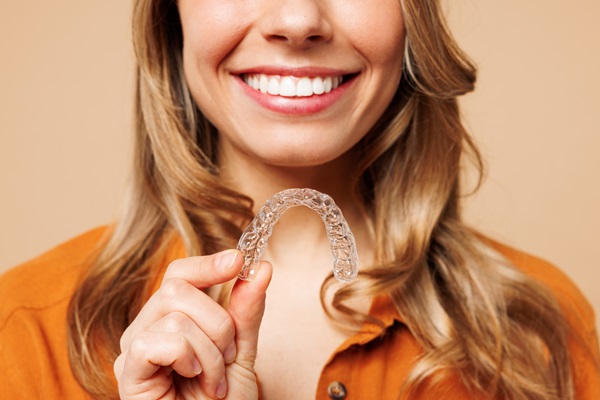Oral Hygiene Information During Invisalign Therapy from a General Dentist

The popularity of Invisalign® has grown as the treatment has proven to produce successful and positive results. Additionally, the treatment process is unlike any other. The actual process is a lot simpler than traditional approaches, and there are benefits that come with Invisalign® too.
One more important part of Invisalign® treatment is the need to remain disciplined with wearing the actual aligners. Because Invisalign® is removable, wearers are encouraged to keep the actual piece in for 22 hours a day. The only time the aligners should be removed is to eat and for oral hygiene. Keep reading to find out more.
Oral hygiene during Invisalign® treatment
Below is a quick overview of what one's oral hygiene routine should look like during the Invisalign® treatment process. This information may be helpful to those wearing Invisalign®.
Brushing
The most important oral hygiene tip to follow is to brush! Of course, this is crucial even outside of Invisalign® treatment. However, it is especially important during teeth straightening because the teeth are constantly shifting, thus resulting in changes in the mouth. Because of the shift that occurs during Invisalign®, the teeth may have more openings in small areas that can hold food debris. This puts the teeth and gums at risk of developing cavities.
General dentists recommend using a soft or medium-bristled toothbrush twice a day; however, after every meal is also highly recommended. When food debris is immediately removed, there is a lower chance that cavities will develop.
Flossing
Flossing is just as important as brushing, especially when undergoing Invisalign® treatment. Flossing keeps food debris away from the gums while also ensuring that the teeth stay in good shape too. Generally speaking, flossing can be done once a day; however, with Invisalign® treatment, it is best to do it after eating. The teeth become enclosed by the aligners immediately after eating, which is why flossing is important. Without flossing, any stuck food debris will have time to negatively impact the teeth and gums.
Rinsing
Rinsing is a big part of maintaining good oral hygiene during Invisalign® treatment. As stated earlier, the teeth and gums become immediately enclosed after eating. Rinsing the mouth after eating can be helpful in removing any excess food debris.
It may not be possible to brush and floss after eating every time, especially if the meal is at a restaurant or at a family member's home. Rinsing allows for some oral hygiene to be done until brushing and flossing can be done. Water is the best option as it clears the entire oral cavity and washes anything away without harming the teeth and gums, as soda or sugary beverages could.
Find out more about Invisalign®
It is important to follow the tips that are listed above when undergoing Invisalign® treatment. Without good oral hygiene, wearers put their oral health at risk, which can result in the need for restorative work while also undergoing Invisalign®. To learn more about Invisalign® and the requirements for oral hygiene, reach out today.
Request an appointment here: https://smilecenterdentalcare.com or call Smile Center Dental Care at (253) 326-6230 for an appointment in our Federal Way office.
Check out what others are saying about our dental services on Google: Invisalign in Federal Way, WA.
Related Posts
If a patient suffers from misaligned teeth or a misaligned bite, Invisalign® clear aligners might be the solution they need to ensure their smiles stay bright – and straight! As one of the most trusted clear aligner systems will help straighten teeth and correct the bite without wires and brackets, meaning that patients can smile…
Invisalign® clear aligners can straighten teeth without compromising the appearance of a patient's smile. These invisible braces are made out of clear plastics and are barely noticeable when worn. It is a huge change from the traditional metal braces that were the standard way to straighten teeth for more than a century.Clear aligners straighten teeth…
For those who want straighter teeth without the discomfort and look of metal bracket braces, Invisalign® is a great option. Through good maintenance and proper usage, dental patients can enjoy cosmetic and functional improvements for several positioning concerns related to the teeth. Taking care of the equipment encourages the success of the results and minimizes…
Clear braces and aligners are discreet, effective orthodontic treatments. However, they take different approaches, resulting in different patient experiences. Clear braces use frosted wires and ceramic brackets that remain fixed to the teeth, while clear aligners are removable trays worn throughout the day. These differences impact everything from aesthetics and comfort to your daily routine,…
